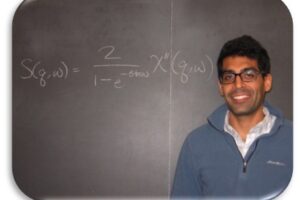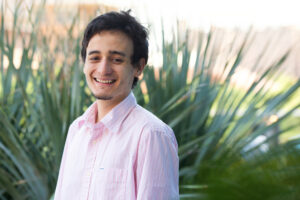This fall, four new Physical Sciences faculty members will be joining the team of curious pioneers that is the Physical Sciences Division. This includes faculty from physics, statistics, astronomy, and mathematics. The division is excited to welcome these four and had a chance to learn more about a few of them.

Anshul Kogar
Kogar will be joining the Physics department, studied physics in undergraduate at UCLA, received his Ph.D. at the University of Illinois-Urbana Champaign. Kogar was a postdoc at both Argonna National Lab in Chicago, and then at MIT. He specializes in matter under conditions where both quantum mechanics and quantum statistics are prerequisite for understanding their macroscopic properties.
When I first moved to the US about 14 years ago, UCLA was where I landed. I am so excited to give back to the community where I’ve felt most at home in the US.
What inspired me the most in physics was something I learned while I was in high school in Bangkok, Thailand. Back then, my high school teacher explained the idea of the famed two-slit experiment, which was performed with electrons. Until today, I don’t understand the experiment and its more sophisticated modern-day variants. As I grew older, I have continued to think about such experiments, but I also realized that the problem is so difficult that it is also necessary to think about problems that I can potentially solve in my lifetime. Being a professor will allow me to continue to think about such issues and also share them with future generations. If I can’t solve the problem, hopefully one of the students who I teach will.
STEM, and physics in particular, suffers from demographic issues. Thus, I would like to engage with under-served middle and high schools around LA. Hopefully, we can figure out a way to inspire a more heterogeneous pool of students to pursue scientific fields, where their ideas would be highly valued.
As for advice to anyone looking towards academia in Physics I’d say learn as widely and broadly as possible. People generally come up with good ideas by synthesizing information from disparate places.
Also, in any field, the most important breakthroughs often occur through the process of struggling, persisting and overcoming problems. Even if the problems aren’t solved, the mental struggle and persistence are still worth the effort.

Oscar Madrid Padilla
Oscar Madrid Padilla will be joining the statistics department, he received his bachelor’s degree in mathematics in CIMAT, Mexico, and his PhD in statistics at the University of Texas at Austin. He then pursued his postdoctoral work at UC Berkeley.
I always wanted to be a professor for two main reasons. I enjoy solving problems, and statistical research is the perfect environment for that, given its interplay with many other disciplines. Second, I have always been passionate about teaching.
The statistics department at UCLA is a very exciting place to be. It has several things that attracted me: world class faculty, academically strong students, and being in LA is definitively a plus.
While at UCLA I look forward to expanding my research agenda, establishing connections with researchers and students from statistics and other disciplines. Also, I’m excited about mentoring UCLA students in doing research in statistics.
If I were to tell a student looking to go into academia for statistics, I would say to start studying statistics earlier in my undergraduate degree, because I started very late!
As for undergraduate students, I think it can be beneficial to do research going somehow out of their comfort zone. For me, that was how I discovered my interest for statistics!
Erik Petigura
Petigura will be joining the faculty of Astronomy. He grew up in Palo Alto, California, and received his bachelors and PhD in physics and astrophysics from UC Berkeley. His thesis focused on measuring the prevalence of Earth-like planets using NASA’s Kepler mission. Petigura then did postdoctoral research at Caltech as a Hubble and Sagan Fellow. He focused on the compositions and orbital architectures of exotic planets not found in our solar system.
When I was about five my parents rented the original “Cosmos” series with Carl Sagan. I’m not going to pretend like I understood most of it, but there was something about the grandeur of the universe that drew me toward a lifelong love of science and astronomy. Being a professor gives me the opportunity to continue to uncover the mysteries of the universe and to help train the next generation of scientists.
Teaching at UCLA has been a dream of mine for years. The department is lovely, and everyone is so collegial and supportive. I’m also a product of California public schools from grade school up to my PhD. I’m a firm believer in the mission of the University of California, and I’m thrilled to contribute to it.
Besides teaching, my other major focus here is conducting research that addresses the most compelling puzzles in exoplanet science. Right now, I’m broadly interested in understanding whether our not our solar system is some fluke of planet formation, or whether it follows a common pattern that’s repeated around many stars. Of course, this has deep implications on the emergence of life around other stars. Out of the office, I want to continue playing in my band, The Seventh Season, and someday traverse the length of California on my bike.
As a UC Berkeley alum, I know how overwhelming a school as big as UCLA can feel at times. Here, don’t expect anyone to hold your hand. Advocate for yourself. Struggling in a class? Go to office hours. Wanna do research? Reach out to faculty. The doors to so many opportunities are here, but you need to be the one to walk through them. Follow your interests and enjoy the journey.
Pavel Galashin
Galashin will be joining the mathematics department this fall, he was a PhD student at MIT and studied mathematics as an undergraduate at St. Petersburg State University. His interests include algebraic combinatorics, with a focus on total positivity and cluster algebras.
Up until my fourth year as an undergraduate, I was pretty sure I would become a software developer. In fact, I was already working full time at a software company. But then I asked a professor at my university for an open problem and tried to solve it. This was when I realized that math research (and teaching) is something I’d like to keep doing, and so far it’s been only getting more and more addictive as time goes by.
UCLA is one of the very top schools in general and in math in particular, and the student crowd here is extremely strong and diverse. Plus there is a high demand for combinatorics classes which is what I mostly will be teaching, so I am very excited to share the things I already know, and learn some new things along the way.
My advice to undergraduates would be to keep a healthy balance between “classes” and “research”. Most of my peers (myself included) were focused on either paying attention to the lectures or solving tricky problems, but not both. I think the key is to mix these activities together. Personally, I wish I had spent a bit more time listening to what the lecturers had to say; several subjects that I originally discarded as non-interesting are now at the core of my everyday research life
Tags: Faculty News